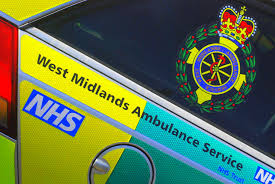Outstanding performance from apprentices hailed by bosses.
Dozens of apprentices working for West Midlands Ambulance Service are making an “outstanding” contribution in the fight to provide exceptional patient care during the corona virus pandemic.
At any one time, up to sixty apprentices can be learning their trade with the Trust’s non-emergency patient transport service working on contracts in Coventry, Warwickshire, Birmingham, the Black Country and Cheshire.

Assistant Chief Ambulance Officer, Michelle Brotherton, who runs the Trust’s PTS service said: “Our apprentices have really risen to the challenge during the Covid-19 outbreak. They form part of our PTS crews and have been dealing with both Covid and non-Covid patients during the pandemic, which has allowed us to provide the very highest standard of patient care.
“We see them as exactly the same as our full-time staff. Only today, six apprentices passed their course and we offered them permanent positions with the Trust. We have an excellent record of supporting our apprentices to achieve all they can.”
Gill Durkin, business development director of PTP Training, which trades as Performance Through People, said: “We have been overwhelmed at the outstanding response of our apprentices during this difficult time.
“Those working on the front line in the health service have been both extremely brave and busy at work, whilst also making the time to continue with their learning.”
Dylan Bamber is an apprentice on the WMAS Cheshire Patient Transport Service contract and is based in Warrington. Just 17, he said: “COVID-19 has made things more intense, but we’ve carried out exactly the same job as we did before.
“We have had to transfer patients who are suffering from COVID-19, and this involves wearing personal protective equipment at all times. I’ve not found it frightening, because you sign up to the job knowing you’re facing potentially fatal diseases. To be honest, I’ve worried more about the patients.”
Dylan hopes to qualify as a paramedic one day; it’s something that many apprentices have gone on to achieve in the past according to Michelle Brotherton: “An apprenticeship is a really good way of coming into the organisation. They get to experience a variety of roles whether discharges of patients from hospital or taking renal patients into their appointments; it provides a real grounding on how to talk and interact with patients.
“Dozens of our apprentices have then gone on to train further either as a paramedic or in another role within the Trust such as in our emergency operations centres taking 999 calls.
“We are always on the look out for new apprentices because we know that we get great staff who we are proud to help develop their skills which ultimately helps patients.”


